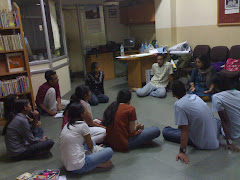M4H - Ek SMILErs ki Nazar Se
Smile ke andar hai ek program,
‘Music for Harmony’ hai jiska naam,
Sandesh hai iska ek hi, shanty aur badhana,
Logon ke dilon mein, ummeed ki roshini jalana.
Shanti ke program ne,
success khoob kamai,piche hua kya,
kitni khalbali isne machai,
aao hum milke yeh batate hain,
Lodhi garden mein thoda fun late hain.
Hoch-poch, hoch-poch,
Yeh tha shuru mein haal,
Manmeet, Namrata, Kanika ka,
Sir dard se tha haal behaal,
Dheere-dheere SMILErs ne,
Seriousness apni dikhai,
Sur apne ideas deke,
Manmeet ki diary badhai.
Dili Haat ke alawa,
na tha kuch bhi pakka,
josh tha itna andar,
par mila nahi tha dhakka,
SMLIErs ne wahan jakar,
Jagah ki ki napai,
Aur tab jake side events ki list ban payi.
Resource aur poster ki meeting,
Campus mein bithai,
Thode se kaam ke baad,
Namrata ne treat khilai,
Dhabe mein SMILErs ne jam kar khaya,
Namrata ki pocket ko khali karwaya!
Peace package ke kaam mein,
Lag gaye sab log,
Itne colours ke beech mein,
Painting ka pehla rog,
Subah se sham tak chalta tha yahi kaam,
Par uth jate the sab sunkar tikki ka naam.
Conflict map, banner aur exhibition ne kiya kamal,
Aur ‘Music for Harmony’ ne macha diya dhamaal!!
Gaane kitni bhashaoon aur states ke logon ne gaaye,
Face painting mein jane kittno ne peace symbols banwae,
Clay modeling mein bacchon ne khoob kari masti,
Chudiyan aur diye sajakar,
Kar di raunak dugni.
Pravah ke natak neb hi,
Khoob dhoom machai,
Anyaaye aur ladai ke khilaf
awaaz uthai,
sham ko toh jaise ek suroor sa dil mein chaya,
SMILErs ne nach-nach ke shor bindaas machaya.
Candles jalake end mein,
sabne milje banaya symbol,
which represents
and a heart that is humble
Aise hua ‘Music for harmony’ ka ant,
aur last line banne se pehle mera
Brain ho gaya band!
Posted in: Some precious moments from Music for Harmony on Sunday, March 9, 2008 at at 12:29 PM 0 comments
